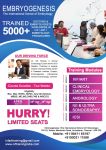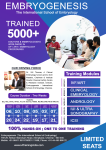
IVF NewsNews: Study Finds High-Dose Gonadotrophin Stimulation Impacts Oocyte and Early-Stage Embryo Development in IVF Treatments
IVF.net Newsdesk 22 April 2023
Researchers have recently published findings of a retrospective study comparing natural cycle IVF (NC-IVF) and conventional IVF (cIVF) treatments to investigate the impact of high-dose gonadotrophin stimulation on oocyte and early-stage embryo development. The study analyzed 616 NC-IVF and 167 cIVF cycles, involving a total of 2110 oocytes. In NC-IVF cycles, only human chorionic gonadotrophin was used to trigger ovulation. In contrast, cIVF cycles employed antagonist protocols, with daily doses of 150-300 IU of human menopausal gonadotrophins. The primary outcomes of the study were the presence of mature (metaphase II) eggs, zygotes, and embryos with good morphology two days after egg retrieval. The study found that the mature oocyte rate, the zygote rate per oocyte retrieved, and the zygote rate per mature oocyte were all significantly higher in NC-IVF cycles than in cIVF cycles. However, no difference was observed in the percentage of zygotes that developed into cleavage-stage embryos. For transferred embryos the likelihood of having a good embryo morphology with four blastomeres and a fragmentation of <10% in cleavage-stage embryos was also higher in NC-IVF cycles. These results suggest that high-dose gonadotrophin stimulation affects oocyte maturity, fertilization, and morphology of cleavage-stage embryos in fresh IVF cycles. Despite the retrospective nature of the study and the inclusion of several treatment cycles per participant, the research offers valuable insights into the impact of gonadotrophin stimulation on oocyte and embryo development. It is important to note that while the study found differences in oocyte and embryo parameters, no significant differences were detected in pregnancy and live birth rates. Additional research is needed to determine whether the observed effects on oocyte and embryo development also impact pregnancy and live birth outcomes. This study contributes to the growing body of evidence suggesting that high-dose exogenous gonadotrophins may affect oocyte and embryo quality, with potential implications for IVF treatments, particularly for poor and very poor responders. Further research is needed to evaluate the potential impact of these findings on pregnancy and live birth rates, as well as to explore alternative treatment strategies for patients with diminished ovarian reserve. Sources and References Does high-dose gonadotrophin stimulation have an effect on oocyte and early-stage embryo development? [ Full Article ] News: Eggs produced from male stem cells lead to creation of mice with two fathers
Dr Emma Green 03 April 2023
Egg cells have been generated from male mouse cells and, once fertilised and implanted into female mice, have developed seemingly healthy, fertile offspring. The research was presented at the Third International Summit on Human Genome Editing at the Francis Crick Institute in London, by Professor Katsuhiko Hayashi, now at Osaka University, Japan. However, the work has yet to be published in a peer-reviewed journal. This early, proof-of-concept technique could assist with some types of infertility and, if able to overcome a number of technical and ethical barriers, could eventually lead to children with two biological fathers. 'This is the first case of making robust mammal oocytes [egg cells] from male cells,' Professor Hayashi said in his presentation. The original aim of the research was to address infertility in women with Turner syndrome who only have one X chromosome, since egg development requires two X chromosomes. The researchers chose to use male cells which have an X and a Y chromosome, since the Y chromosome is smaller, and can be lost naturally when cells are grown in the lab. The process first involved turning male mouse skin cells into induced pluripotent stem cells (iPSCs), which have the potential to develop into almost any type of cell. They then extracted the cells which had naturally lost the Y chromosome. The researchers then used a technique to generate cells with two X chromosomes. By providing a mixture of signals, they were able to turn the XX iPSCs into immature eggs. The eggs were then fertilised with mouse sperm and the embryos were transferred to the uterus of female mice. The mouse pups generated from this technique were healthy, grew normally, and were fertile adults. However, the success rate was low, with only seven pups developing from 630 transferred embryos. 'The trick of this, the biggest trick, is the duplication of the X chromosome,' said Professor Hayashi. 'We really tried to establish a system to duplicate the X chromosome.' During his speech, Professor Hayashi confirmed that much work still needs to be undertaken and that any medical applications of this work are still a long way off. The research team are currently comparing the mice generated from this technique to those bred using conventional methods. 'There are big differences between a mouse and the human,' said Professor Hayashi. He explained that these differences can complicate the transfer of research from the lab to the clinic, in particular because egg and embryo development takes much longer in humans than in mice. 'If you're going to apply this in humans, you really want to err on the side of safety, caution and efficiency,' Professor Keith Latham, a developmental biologist at Michigan State University (who was not involved in the research) told New Scientist. Sources and References
[ Full Article ] News: Sex selection technique 80 percent effective
Dan Jacobson 03 April 2023
A new technique for selecting sperm during assisted reproduction appears to produce embryos of a desired sex with 80 percent accuracy. The research took place in the USA where it is legal for parents having IVF to select the sex of their child. The sperm were sorted by weight, as the X chromosome is larger than the Y chromosome, meaning that X-bearing sperm are, on average, heavier than those containing a Y. While this sperm sorting technique appears safe and effective, the study has raised long-standing ethical concerns surrounding embryo sex selection. Study leader, Professor Gianpiero Palermo, from Weil Cornell Medicine in New York described the technique as 'extremely safe as well as efficient, inexpensive, and ethically palatable.' 'The sperm [in the study group] moved well, and the sorting technique didn't impair sperm in any shape or form', he said. The study, published in PLOS One, involved 1317 couples who were having IVF, of whom 105 wanted a child of a particular sex. For those couples, the sperm sorting technique was used, and then in all cases, the collected eggs were fertilised using ICSI. There were no significant differences between the couples who used sorted or unsorted sperm in terms of fertilisation or pregnancy rates. All embryos in both groups underwent PGT-A, which was also used to determine the sex of the embryos. For the couples who wanted a girl, 79 percent of their embryos were XX, and for those who wanted a boy 80 percent were XY. The 29 children born as a result have been followed up for three years so far and are healthy and developmentally normal. Ascertaining an embryo's sex by PGT-A is close to 100 percent accurate and US couples can already use this to choose the sex of the embryo transferred. However, the new technique can give them more embryos of their desired sex from a single round of egg collection. Attitudes to sex selection vary around the globe, and in the UK its use is strictly limited to preventing transmission of gender-specific inherited diseases. 'At present, in the UK, it is not permitted to choose the sex of a child for non-medical reasons', said Sarah Norcross, director of PET. She added, 'there was a loophole in the 1990 legislation that originally governed this area, but this loophole was closed in 2008.' However, while embryo sex selection remains controversial, there may be some indications that attitudes are changing according to research conducted last year by Ipsos, and commissioned by PET. 'Overall, permitting sex selection was opposed by 57 percent of the UK public, and was supported by only 28 percent', said Norcross. However, among 16- to 24-year-olds, half supported sex selection. Sources and References
[ Full Article ] Webinar: THE INTELLIGENT SPERM
International IVF Initiative 13 March 2023

Tuesday, 14th March (3 pm EST / 7 pm UK /8 pm CET) NOTE TIME DIFFERENCE This webinar is kindly sponsored by IVF2.0 Ltd. [ Full Article ] News: Eggs produced from male stem cells lead to creation of mice with two fathers
Dr Emma Green 13 March 2023
Egg cells have been generated from male mouse cells and, once fertilised and implanted into female mice, have developed seemingly healthy, fertile offspring. The research was presented at the Third International Summit on Human Genome Editing at the Francis Crick Institute in London, by Professor Katsuhiko Hayashi, now at Osaka University, Japan. However, the work has yet to be published in a peer-reviewed journal. This early, proof-of-concept technique could assist with some types of infertility and, if able to overcome a number of technical and ethical barriers, could eventually lead to children with two biological fathers. 'This is the first case of making robust mammal oocytes [egg cells] from male cells,' Professor Hayashi said in his presentation. The original aim of the research was to address infertility in women with Turner syndrome who only have one X chromosome, since egg development requires two X chromosomes. The researchers chose to use male cells which have an X and a Y chromosome, since the Y chromosome is smaller, and can be lost naturally when cells are grown in the lab. The process first involved turning male mouse skin cells into induced pluripotent stem cells (iPSCs), which have the potential to develop into almost any type of cell. They then extracted the cells which had naturally lost the Y chromosome. The researchers then used a technique to generate cells with two X chromosomes. By providing a mixture of signals, they were able to turn the XX iPSCs into immature eggs. The eggs were then fertilised with mouse sperm and the embryos were transferred to the uterus of female mice. The mouse pups generated from this technique were healthy, grew normally, and were fertile adults. However, the success rate was low, with only seven pups developing from 630 transferred embryos. 'The trick of this, the biggest trick, is the duplication of the X chromosome,' said Professor Hayashi. 'We really tried to establish a system to duplicate the X chromosome.' During his speech, Professor Hayashi confirmed that much work still needs to be undertaken and that any medical applications of this work are still a long way off. The research team are currently comparing the mice generated from this technique to those bred using conventional methods. 'There are big differences between a mouse and the human,' said Professor Hayashi. He explained that these differences can complicate the transfer of research from the lab to the clinic, in particular because egg and embryo development takes much longer in humans than in mice. 'If you're going to apply this in humans, you really want to err on the side of safety, caution and efficiency,' Professor Keith Latham, a developmental biologist at Michigan State University (who was not involved in the research) told New Scientist. Sources and References
[ Full Article ] Announcement: 1 WEEK INDIVIDUAL HANDS-ON IN ART
Marc Van den Bergh 09 March 2023
TO GUARANTEE AN OPTIMAL AND EFFICIENT TRAINING WE TAKE ONLY 2 STUDENTS PER SESSION AND EACH STUDENTS HAS HIS OWN ICSI STATION DURING A FULL WEEK. THE COURSE IS ACCREDITED BY THE ROYAL SOCIETY OF BIOLOGY WITH 186 CREDITS FOR CONTINUOUS PROFESSIONAL DEVELOPMENT. THE COURSE FEE INCLUDES ALSO ACCOMODATION, MEALS AND COURSE MATERIAL. NEXT SESSION : 7th to 14th May 2023 [ Full Article ] News: ART & Embryology training program
Chennai Fertility Center and Research Institute 03 March 2023

April 2023 Training Batch Schedule - 10th Apr - 24th Apr 2023. The International School of Embryology was established to offer training for clinicians in advanced reproductive technologies. Our skill and precision to all aspirants help them to know in-depth knowledge and experience. The members of our teaching faculty aim to bring doctors and embryologists to the highest level of knowledge about reproductive techniques and practical capability in the field. Our courses cover basics in Andrology, embryology, ICSI, and cryosciences (Hands-on). Limited Seats. For admission Contact 9003111598 / 8428278218 (Whats app) [ Full Article ] Announcement: Hands-on Training on Simulators: OPU & ET
Dr. Sarabpreet Singh 27 February 2023

The Fertilis Academy and Sadbhawna IVF School have announced a 2-day course focusing on the "Hands-on Training on Simulators: OPU & ET". Beginning on 2nd March 2023 from 9 AM IST onwards. [ Full Article ] News: ART & Embryology training program
Chennai Fertility Center and Research Institute 23 February 2023

2023 Training Batch Schedule's -
The International School of Embryology was established to offer training for clinicians in advanced reproductive technologies. Our skill and precision to all aspirants help them to know in-depth knowledge and experience. The members of our teaching faculty aim to bring doctors and embryologists to the highest level of knowledge about reproductive techniques and practical capability in the field. Our courses cover basics in Andrology, embryology, ICSI, and cryosciences (Hands-on). Limited Seats. For admission Contact 9003111598 / 8428278218. [ Full Article ] News: IVF does not impact cardiometabolic health of offspring
Melinda Van Kerckvoorde 13 February 2023
An international multi-cohort study shows that people conceived using IVF and ICSI have no significant differences in cardiometabolic health compared to naturally-conceived children. Previous attempts to study the potential adverse consequences of fertility treatment on offspring health have been limited due to poor sample size, short follow up or relatedness between comparison groups. Now 14 cohort studies of children born since 1982 have been analysed to compare cardiometabolic health outcomes between children conceived via IVF or ICSI, and naturally-conceived children at different ages. 'This is the largest study of its kind and could not be conducted without data from studies such as Children of the 90s,' said Dr Ahmed Elhakeem, author of the study and research fellow in epidemiology at the University of Bristol medical school. 'Parents conceiving or hoping to conceive through assisted reproductive technology and their offspring should be reassured that cardiometabolic health appears to be comparable in ART-conceived and naturally-conceived children.' The meta-analysis, published in European Heart Journal, selected 14 population-based birth cohorts with a low prevalence of relatedness and examined differences in blood pressure, heart rate, lipids and glucose in children conceived naturally and those conceived using fertility treatment. One of the cohorts was the UK's Children of the 90s study, which has followed over 14,000 pregnant women from the Avon region since 1991. From a total of 35,938 individuals included in this study, 654 were conceived using IVF or ICSI and most were children below 10 years of age, though some cohorts included data for offspring born from 1982 onwards. No statistical differences were found in blood pressure or heart rate between naturally-conceived children and those conceived via fertility treatment. Biomarker levels such as lipids, glucose and insulin resistance markers were also similar in both groups. Additionally, the study analysed the change in cardiometabolic outcomes for offspring from the ages of 2-26 years using data taken at different time points from over 17 000 individuals. As a result, the researchers found a predicted increase in systolic blood pressure and lipids in young adulthood, although most differences were not statistically significant. Furthermore, cholesterol levels were found to be significantly higher in children conceived using fertility treatment but these did not persist to adulthood. According to Peter Thompson, chief executive at the Human Fertilisation and Embryology Authority which acts as the UK fertility sector's regulator: '60,000 patients using fertility services in the UK each year in the hope of one day having a family of their own should be reassured by this study which shows that the heart health of children born from assisted reproduction technologies, like IVF, are no different from children conceived naturally.' Sources and References
[ Full Article ] |